Environment & Energy
Related: About this forumWhy Solar Installations Cost More in the U.S. than in Germany
http://www.technologyreview.com/news/509196/why-solar-installations-cost-more-in-the-us-than-in-germany/[font size=4]A new report from Lawrence Berkeley National Laboratory points to specific areas where costs could be lowered.[/font]
[font size=3]In 2011, residential solar system installers paid a little over $1.80 per watt for solar panels in both Germany and the United States. In Germany, installers added $1.20 to the cost of the solar panel to complete an installation. But in the U.S., they tacked on $4.36 per watt, more than three times as much.
A report (PDF) released this month by Lawrence Berkeley National Laboratory explains why.
The most obvious difference between the United States and Germany is the total amount of solar power installed in each country—there’s five times as much installed in Germany.
The study concludes, however, that the learning curve isn’t enough to explain the price disparity—it might account for only half of it. Instead, based on a survey of U.S. and German installers, it seems that there are some fundamental differences in the U.S. and German markets that could keep prices higher in the U.S.—unless something is done to address them.
…[/font][/font]
PoliticAverse
(26,366 posts)leveymg
(36,418 posts)PoliticAverse
(26,366 posts)And there's higher government sales taxes on the panels.
NoOneMan
(4,795 posts)After all, higher wages and profits result in more money to buy oil for our pimped out rides
OnlinePoker
(5,719 posts)NoOneMan
(4,795 posts)Averting climate change by any means possible (though I believe you constructed a false dichotomy), or pursuing a false notion of equality in the process within an inherently unequal country that fools itself while exploiting much of the third world?
With that said, I have doubts that putting up shiny solar panels on every house in the country to power our exploitation-built toys--while exporting our coal and oil to the developing world--is really going to do much for climate change.
OKIsItJustMe
(19,937 posts)Are we currently exporting our coal and oil to the developing world?
Because coal production doesn’t seem to show that:

[font size=1]Based on data from http://www.eia.gov/coal/production/weekly/[/font]
NoOneMan
(4,795 posts)If we did, do you think we are just going to sit around and stare at our unused "dirty" resources?
OKIsItJustMe
(19,937 posts)The drop in demand has driven Patriot Coal into bankruptcy!
http://dealbook.nytimes.com/2012/07/09/patriot-coal-files-for-bankruptcy-protection/
http://www.patriotcaseinfo.com/
So, why aren’t we exporting coal now?
Doesn’t the developing world want our coal yet!?
NoOneMan
(4,795 posts)Their imports grow at a staggering rate. If the US coal industry can learn to compete (freight considered), they'll slurp ours up too.
Africa is growing finally by leaps and bounds, and coal will be their choice fuel as well.
Are you really suggesting the "coal age" is dead; that world-wide demand will drop for this unattractive fuel and we will just leave it below our feet once our shiny solar panels are in place?
OKIsItJustMe
(19,937 posts)So, I hardly expect large scale use of solar to increase coal production.
You say that “China loves coal.” I'm not so sure:
http://www.nytimes.com/2012/10/23/world/asia/china-residents-protest-coal-power-plant.html
By THE ASSOCIATED PRESS
Published: October 22, 2012
[font size=3]Residents of a town in southern China said Monday that demonstrators protesting the building of a coal-fired power plant had thrown bricks at police officers who fired volleys of tear gas and detained dozens of people in the latest unrest over an environmental dispute. At least 1,000 people in the town, Yinggehai, on Hainan Island, began protesting last week after construction resumed on the plant, which had been halted by earlier demonstrations. Dozens have been injured and many detained by the police, who have put the town under strict surveillance, residents said. The police and local officials declined to comment. [/font][/font]
(See that happening much in the US?)
They do love solar. They love it more than we do!
http://www.greentechmedia.com/articles/read/How-Much-Solar-Can-China-Install-Domestically-100GW-by-2020
[font size=4]It could be 10 gigawatts by 2015 and 50 gigawatts by 2020—“although 100 gigawatts by 2020 is not out of the question.”[/font]
Eric Wesoff: August 6, 2012
[font size=3]…
Forecasts on 2012 China PV numbers range from 3 to 8 gigawatts. (The U.S. PV market is forecast at 3.2 gigawatts according to GTM's U.S. Solar Market Insight report.)
GTM Research has China at 5.5 gigawatts in 2012, with installations predicted to hit 30 gigawatts cumulative by 2015. Suntech's estimate is four to five gigawatts this year. Carsten Körnig, Managing Director of the German Solar Industry Association, has the China solar market at four gigawatts in 2012.
…[/font][/font]
NoOneMan
(4,795 posts)
Its increased by 50% in the last decade alone.
China & India build 4 new coal plants every week. These plants must operate many decades to become cost-neutral. They are not building them to look at.
Do you really suggest that we are soon to see a new "golden age" where we just let dirty energy sit idle beneath our feet that could readily be used in some part of the world?
FBaggins
(26,721 posts)Coal production has dropped even after accounting for far larger exports.
Net coal exports in the last year and a half rose to record levels. With 2012 triple those of just three years earlier (using a conservative guestimate for Nov/Dec).
OKIsItJustMe
(19,937 posts)So, I guess I don’t see the nightmare scenario playing out…
NoOneMan
(4,795 posts)The US has shown a dip but the entire world is surging ahead, illustrating their growing thirst for this commodity. Will the US not increase their exports when they become competitive? Will the US let the coal sit idle beneath their feet?
Another question: does the world need the US's coal to bake the world with their emissions?
OKIsItJustMe
(19,937 posts)NoOneMan
(4,795 posts)
What will prevent exports from increasing when global coal consumption is ever increasing?
NoOneMan
(4,795 posts)This increase in exports marks a significant reversal from the general downward trajectory of U.S. coal exports beginning in the early 1990s, which bottomed out in 2002 just under 40 million tons, the lowest level since 1961. Coal exports in 2011 rose 171% from 2002, with only a brief interruption by the global recession. Export growth accelerated after the recession, with consecutive post-2009 growth of more than 20 million tons per year, a level of growth not seen since the 1979-to-1981 export boom. Current data for 2012 (through August) show coal exports are growing even faster and should more than double 2009 export levels, buoyed by growth in U.S. steam coal.
http://www.eia.gov/todayinenergy/detail.cfm?id=8490
We are using less and the world is demanding more. Is a green future really possible?
Here are some interesting graphics:


The IEA predicts that in OECD countries the decline in coal burning over the next five years will reduce carbon dioxide emissions by 250 million tonnes. But that will be far outweighed by an increase of about 3500 million tonnes of carbon dioxide, as coal consumption intensifies in the non-OECD world.
http://www.carbonbrief.org/blog/2012/12/the-ieas-coal-projections-on-demand-and-emissions
Nihil
(13,508 posts)See post 21
FBaggins
(26,721 posts)Merely correcting your errant assumption that exports must not be up if coal production is down.
Also, keep in mind that capacity for export has a great deal to do with it... particularly when we start talking about natural gas.
Nihil
(13,508 posts)> So, why aren’t we exporting coal now?
> Doesn’t the developing world want our coal yet!?
The main growing market is to your West and the major exporting port
infrastructure is still being expanded there ... as you may have noticed
from E/E ...
e.g.,
If each of the proposed terminals, which range from Bellingham to Coos Bay, is built to capacity,
Washington and Oregon eventually would export 150 million or more tons of coal a year — half
again as much coal as all U.S. exports combined in 2011.
http://www.democraticunderground.com/112722909
The Obama administration’s Bureau of Land Management auctioned a major tract of Wyoming coal
to Peabody Energy at a bargain-basement price of $1.10 per ton yesterday.
...
However, it is likely this coal is intended for the Asian market, where sub-bituminous coal fetches
a much higher price.
http://www.democraticunderground.com/112718891
In other words, it *is* being exported but not fast enough to keep one or two
of your coal companies afloat because yes, the developing world *does* want
your coal.
NoOneMan
(4,795 posts)Did you see this from today?
In 2007, Peabody Energy spun off a new company, Patriot Coal, which inherited 10 unionized mines in Kentucky and West Virginia. Along with the mines, Patriot took on $557 million in healthcare obligations to UMWA retirees. In 2008, Patriot bought Magnum, which had been similarly spun off from Arch Coal three years earlier. From Magnum, Patriot inherited another $500 million in obligations to retired miners, according to the UMWA.
Oddly, for a 5-year-old company, Patriot wound up with nearly three times as many retirees as active employees, more than 90 percent of whom never worked for the company. Overburdened by its debts, in July of 2012 Patriot declared bankruptcy.
In the Coal Fields, a Novel Way to Get Rid of Pensions Is Born
Nihil
(13,508 posts)Almost unbelievable ... but so are so many other acts of sheer greed & inhumanity.
OKIsItJustMe
(19,937 posts)Page 16 lists, "Hypotheses Explored for Why German and U.S. Residential PV Prices Differ"
Page 46 lists, "Summary of Findings from Survey of German Installers"
Page 47 lists, "Summary of Findings from Secondary Analysis"